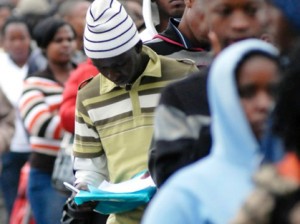Age-related biases in policies, bane to youth development – NYA
 Age-related barriers in the formulation of development policies remain a bane to the sustainable growth and development of Ghanaian youth, Mr Francis Takyi-Koranteng, the Upper East Regional Director, National Youth Authority (NYA) has said.
Age-related barriers in the formulation of development policies remain a bane to the sustainable growth and development of Ghanaian youth, Mr Francis Takyi-Koranteng, the Upper East Regional Director, National Youth Authority (NYA) has said.
“Young people continue to report age-related barriers in various spheres of their lives, particularly in having equal access to education and skills training, employment, political participation, health and justice.
“And irrespective of how one looks at it, at the individual level, these age-related obstacles impact deeply on wellbeing and livelihoods not only during the youth years, but also in adulthood,” he said.
He said there was the need to create an equal environment devoid of discrimination to enhance youth opportunity to access interventions for their growth.
The Regional Director made these remarks in a speech read on his behalf at the celebration of this year’s International Youth Day in Bolgatanga, on the theme, “intergenerational solidarity: creating a world for all ages”.
It was organised by the NYA in collaboration with the Upper East Regional Coordinating Council with funding support from the United Nations Population Fund (UNFPA) and brought together youth groups across region.
The 2021 Population and Housing Census indicated that the youth, that is, age 15 to 35 formed about 36 per cent of the total population and the majority age group in Ghana.
Mr Takyi-Koranteng said despite that, the youth were the most marginalised and vulnerable who did not have equal opportunities that would empower them to contribute significantly to the growth and development of the nation.
“Age biases prevent us from thinking and designing policies and social services that adopt a life-course approach that is fair for all ages, this in other words means the need for a level playing ground for all,” he added.
He said for the country to achieve the Sustainable Development Goals (SDGs), quick action needed to be taken across all generations to ensure inclusive participation in the development processes.
Mr Jude Domisie, the Programme Analyst, UNFPA, explained that the world needed to strategically invest in the youth to sustainably address challenges confronting the growth and development of young people.
He said issues of education and employment needed to be central in policy direction of stakeholders to economically empower the young people for sustainable development and a better future.
This coupled with access to accurate sexual and reproductive health education would help reduce poverty and fight inequality as well as unplanned pregnancies and maternal deaths, he said.
“We must invest in the young people for a better future but if we fail to invest in the young people, we will be creating instability in the future”.
Chief Superintendent of Police, Mr Richard Anaba Salifu, the Bolgatanga Municipal Police Commander, advised the youth to be focused on their education and build their careers.
He urged all young people to resist all temptations to be recruited to destabilise the country.
Source: GNA
